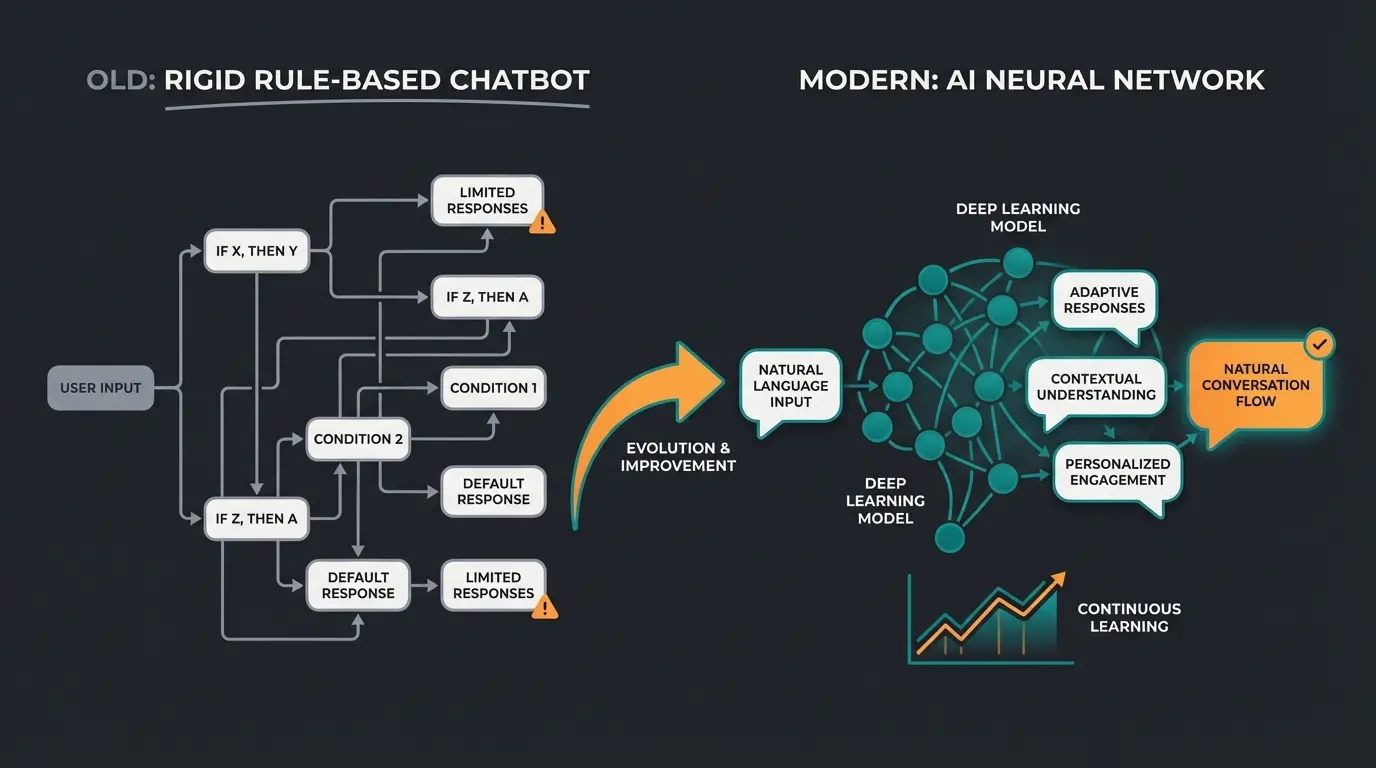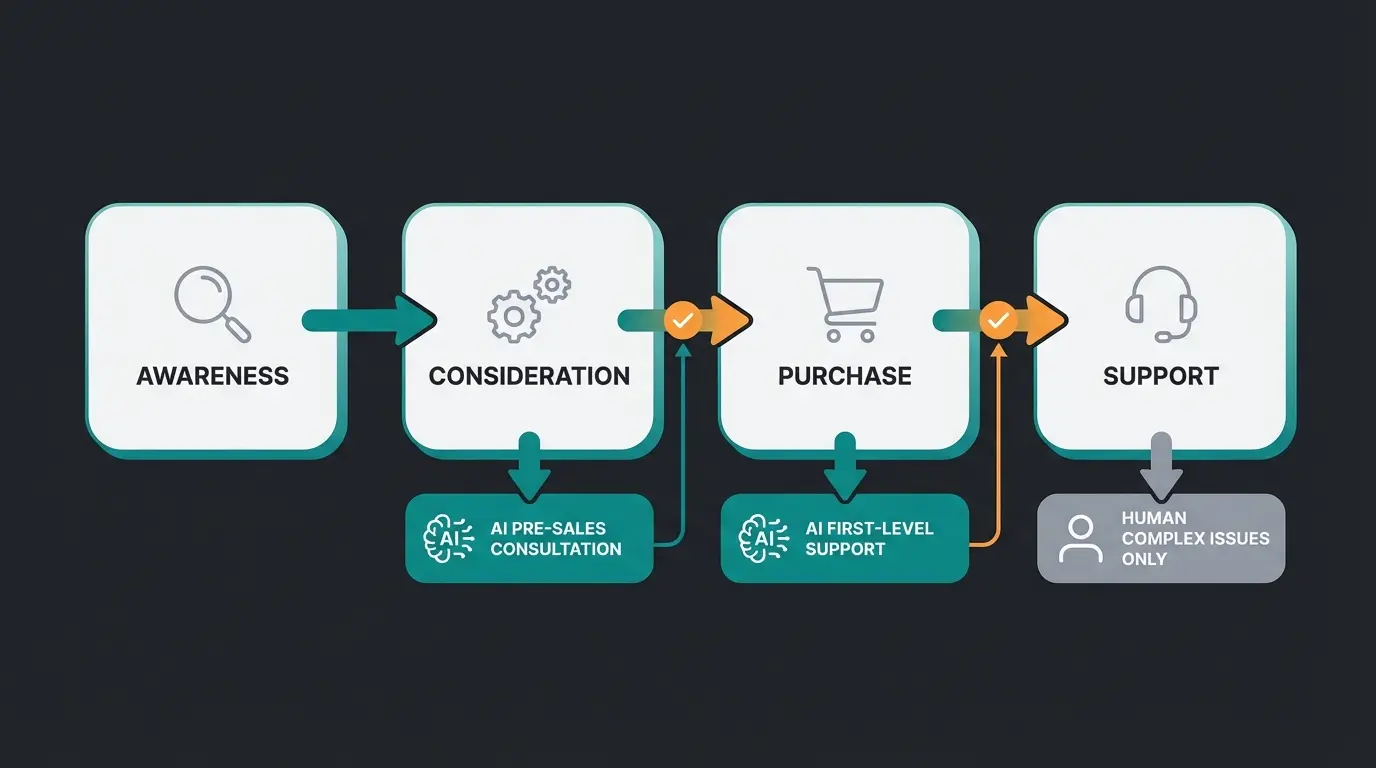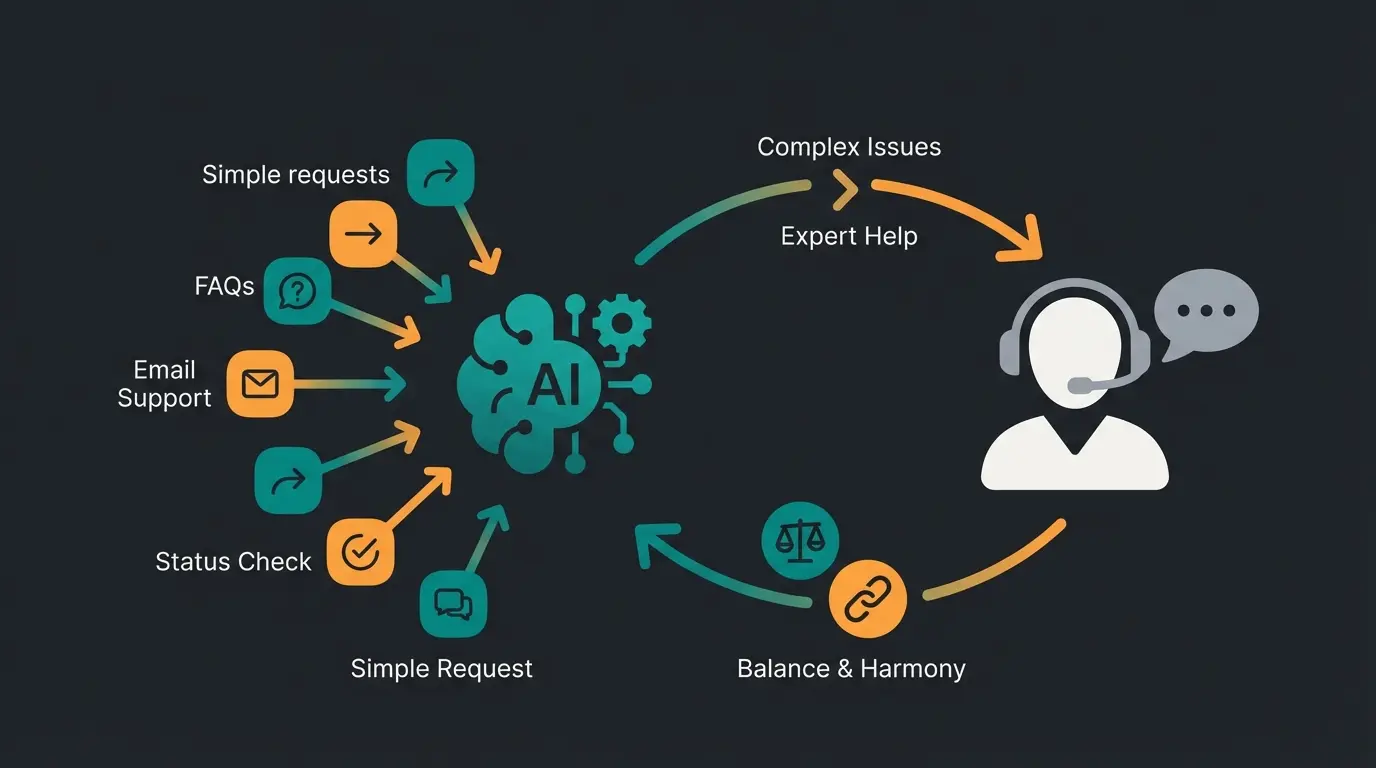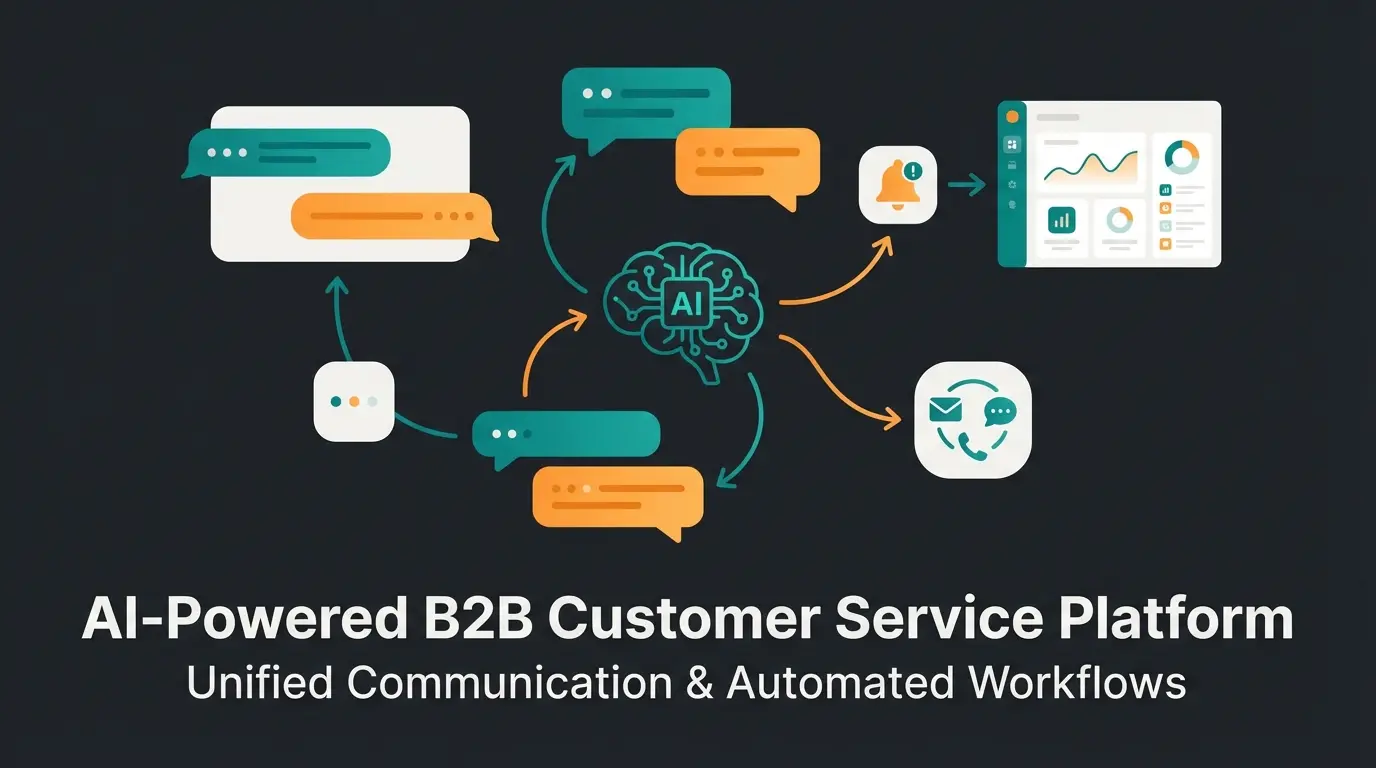Introduction: The AI Customer Service Revolution
The integration of artificial intelligence in customer service is becoming a decisive competitive advantage for businesses. According to a recent study by Nordlight Research, 45% of German consumers already view AI-supported service solutions positively. This growing customer acceptance reflects the added value that AI systems provide in modern customer service.
The measurable benefits speak for themselves: Current implementations demonstrate cost savings of up to 80% while simultaneously improving service quality. Particularly impressive are the average response times of under 5 seconds and resolution rates exceeding 90% with AI-supported systems.
For businesses, this means concrete advantages: 24/7 customer service availability, significantly reduced wait times, and consistently high consultation quality. The automation of repetitive inquiries also enables employees to focus on more complex customer concerns.
But here's what most businesses are missing: the real opportunity isn't just about answering tickets faster. It's about transforming customer service from a cost center into a revenue generator through intelligent product consultation. While competitors focus on deflecting support requests, forward-thinking companies are using AI to guide customers toward purchases—turning every interaction into a sales opportunity.
German consumers trust AI more when it acts human-like (Zendesk 2025)
German companies planning to implement AI by end of 2025 (Bitkom)
Revenue increase for companies using AI for sales consultation
Consumers open to AI for faster solutions, even complex questions
What Is AI in Customer Service Today?
The Evolution: From Rule-Based Bots to Intelligent AI
The functionality of modern AI systems is based on various technologies. As experts explain, current solutions combine Natural Language Processing (NLP) with machine learning algorithms. These technologies enable systems to precisely understand customer inquiries and respond contextually.
Understanding the difference between old and new AI is crucial. Rule-based bots (the 'old' approach) follow predetermined scripts and decision trees. They can only handle questions they've been explicitly programmed for—leading to the frustrating 'I didn't understand that' responses customers despise. Generative AI and Large Language Models (LLMs) represent the 'new' paradigm: they understand context, nuance, and can handle questions they've never seen before.
A particularly effective application area is AI-powered chatbots. These can not only answer standard inquiries but also conduct complex product consultations. The Händlerbund confirms in its analysis the cost efficiency of these systems: implementation costs typically amortize within a few months.
The Rise of Agentic AI
The next evolution is Agentic AI (Agentische KI)—AI that acts autonomously to solve problems, not just chat. Unlike traditional chatbots that wait for user input and respond reactively, agentic AI proactively identifies customer needs, accesses product databases, and makes personalized recommendations without needing step-by-step instructions.
Practical applications span various areas: from automated FAQ responses to personalized product recommendations to proactive customer care. Modern AI systems continuously learn from every interaction, thereby steadily improving their performance. The key advancement is that these systems don't just parse keywords—they understand purchase intent.

Comparing Different AI Systems
When selecting a suitable AI system, businesses must consider various factors. Implementation costs vary depending on the scope of functionality between €5,000 and €50,000. The return on investment (ROI) typically reaches 200-300% in the first year with successful implementation.
Crucial for success is integration with existing systems as well as the quality of training data. AI systems require a solid data foundation to deliver precise and reliable answers. Continuous maintenance and optimization of the systems is an important success factor.
| Feature | FAQ Bot | AI Product Consultant |
|---|---|---|
| Primary Goal | Ticket Deflection | Sales Conversion |
| Knowledge Base | Scripted Responses | Dynamic Product Data |
| Learning Capability | Static Rules | Continuous Improvement |
| Customer Value | Quick Answers | Personalized Recommendations |
| Business Impact | Cost Reduction | Revenue Generation |
| Typical ROI | 50-100% | 200-300% |
The Game Changer: Product Consultation Over Ticket Processing
Here's the insight that separates market leaders from the rest: most support requests are actually pre-sales questions. 'Which size fits me?' 'Is this compatible with my device?' 'Which product is best for my situation?' These aren't support tickets—they're purchase signals waiting to be converted.
Automated customer support offers businesses numerous opportunities to optimize their service. But the real opportunity lies in transforming these pre-purchase questions into guided selling experiences. AI systems are successfully taking on various customer service tasks and achieving impressive results—particularly when focused on consultation rather than just deflection.
From Cost Center to Revenue Driver
The traditional approach: A customer asks 'Which laptop is best for video editing?' and the FAQ bot links them to a generic product category page. The customer gets lost, bounces, and you've lost a sale.
The AI Product Consultant approach: The AI asks clarifying questions—'What's your budget range?' 'Do you need portability?' 'What software will you use?'—and then recommends specific products with reasoning. The customer feels understood, confident, and ready to buy.
German companies are deploying AI solutions particularly successfully in product consultation. A prime example is the AI employee Flora at Neudorff, which achieves 97% accuracy in product recommendations and average response times of under 5 seconds. The cost savings per chat reach an impressive 99.2%.
ROI of Various AI Applications
Investment in AI-supported customer service solutions pays off multiple times for businesses. Analysis of practical cases shows average cost savings of 60-80% compared to traditional customer service models. Simultaneously, customer satisfaction increases through faster response times and 24/7 availability.
Particularly profitable application areas include:
- Product Consultation: Automated recommendations with conversion increases up to 35%
- FAQ Automation: Reduction in processing time by up to 80%
- Order Status: Relief of service team from standard inquiries by up to 90%
- Complaints: Shortening of processing time by an average of 60%
- Upselling/Cross-selling: AI-driven recommendations increasing average order value by 15-25%
Stop losing sales to generic FAQ bots. Our AI Product Consultant guides customers to the right products with 97% accuracy—turning support conversations into revenue.
See It In ActionThe 5 Key Benefits of AI Customer Service
To compete in the market, your AI solution must deliver on these fundamental benefits. But the key differentiator is how you frame them—not just as cost-saving measures, but as competitive advantages that drive growth.
1. 24/7 Availability for Evening Shoppers
E-commerce doesn't sleep. Peak shopping hours often occur after traditional business hours—when your human team has gone home. AI ensures every late-night browser gets the same quality consultation as a 10 AM visitor. This is crucial for capturing impulse purchases and serving customers in different time zones.
2. Scalability for Peak Seasons
Black Friday. Christmas. Flash sales. Traditional customer service requires months of hiring and training temporary staff to handle seasonal spikes. AI scales instantly—handling 10x the normal volume without additional headcount. When the peak passes, you're not left managing layoffs or idle staff.
3. Consistency in Quality
Every customer gets the same high-quality product advice, regardless of which 'agent' they speak with. No Monday morning fatigue, no Friday afternoon rush-to-leave. The AI maintains perfect product knowledge and brand voice across every interaction, eliminating the variability inherent in human teams.
4. Cost Reduction Through Automation
Automating Level-1 inquiries can reduce operational costs by 60-80%. But more importantly, it frees your human agents to focus on high-value, complex cases where their expertise truly matters—improving both efficiency and job satisfaction.
5. Revenue Increase Through Guided Selling
This is the unique angle most competitors miss: AI doesn't just save money—it makes money. By transforming support interactions into consultation opportunities, businesses using AI for guided selling see up to 41% more conversions. The AI becomes a top performer on your sales team, working 24/7 without commission.

Implementation Guide: 4 Steps to AI Customer Service
Successful integration of AI into customer service requires a structured approach. Current studies confirm that systematic implementation is decisive for success. Unlike the 'fluff' of competitor guides, here's a practical roadmap that acknowledges the real work involved.
Assess your product feed quality, knowledge base completeness, and identify data gaps
Start with one channel (web widget) before expanding to omnichannel
Teach the AI your brand voice, product knowledge, and consultation approach
Launch with human oversight for the first 4 weeks, continuously optimize
Step 1: Data Audit—Is Your Data AI-Ready?
Implementation begins with a thorough analysis of existing customer service processes and, crucially, your data infrastructure. The question isn't 'Do you have data?' but 'Is your data ready for AI?' This means examining your product feed completeness, knowledge base accuracy, and historical conversation data.
Key questions to answer: Do you have clean, structured product information? Are product descriptions detailed enough for AI to make informed recommendations? Do you have FAQ data that covers the most common questions? The quality of your AI directly correlates with the quality of data you feed it.
Step 2: Scope—Start Focused, Then Expand
Resist the temptation to automate everything at once. Start with a single channel—typically a website widget—and prove value there before expanding to email, WhatsApp, or social channels. Choose a specific use case where AI can demonstrate clear ROI, such as product recommendations in a single category.
Step 3: Training—Beyond Script Memorization
Training the AI isn't about uploading FAQs. It's about teaching your brand voice, product philosophy, and consultation approach. How does your best salesperson talk to customers? What questions do they ask to understand needs? This is what your AI needs to learn—not just facts, but methodology.
Step 4: Go-Live with Human Oversight
The importance of 'Human in the Loop' cannot be overstated for the first 4-6 weeks. Have team members monitor AI conversations in real-time, flag errors, and provide corrections. This supervised period dramatically accelerates learning and prevents embarrassing mistakes from reaching customers.
Timeline and Budget Expectations
For mid-sized businesses, a realistic implementation timeline is 3-6 months. The budget should account for not just technical costs but also resources for training and adjustments. Practice shows that the investment typically amortizes within 12-18 months.
A realistic implementation plan typically looks as follows:
- Month 1-2: Analysis, data preparation, and concept development
- Month 2-3: Technical integration, AI training, and internal testing
- Month 3-4: Pilot phase with selected customers, gathering feedback
- Month 4-6: Full integration, optimization, and expansion
Challenges and Solutions
The integration of AI in customer service brings specific challenges. The greatest task consists of GDPR-compliant implementation of AI systems. Particularly the handling of personal data requires careful planning and execution.
Ensuring GDPR Compliance
Data protection is at the center of AI integration. Companies must implement technical and organizational measures to ensure the security of customer data. This encompasses encryption of sensitive information, clear access authorizations, and regular security audits.
The legal requirements of GDPR must be considered from the very beginning. Central aspects include transparent communication to customers about AI deployment and secure storage of personal data. German consumers are particularly skeptical—54% trust AI more when it acts human-like, but they also demand to know when they're speaking with an AI.
Building Trust Through Transparency
German users fear 'fake' AI—systems that pretend to be human or make up answers. Differentiate by explaining how your AI accesses product data through Retrieval Augmented Generation (RAG) to ensure accuracy, unlike hallucinating GPT wrappers that generate plausible-sounding but incorrect information.
Key trust-building measures:
- Always disclose when customers are speaking with an AI
- Explain where data is hosted (e.g., 'Server location: Europe')
- Provide easy escalation to human agents when requested
- Show the AI's reasoning for product recommendations
Ensuring IT Security
IT security expert Dr. Michael Schmidt from TU Munich emphasizes: 'The integration of AI systems in customer service requires a well-thought-out security concept. Companies should pay particular attention to communication encryption and secure authentication methods.'
The technical security of AI systems must be protected through multiple measures. These include regular security audits, encrypted data transmission, and access management systems. A professional AI solution already offers integrated security features.
Practical solution strategies for these challenges include:
- Data Protection: Implementation of privacy-by-design principles
- Security: Regular penetration tests of AI systems
- Compliance: Automatic GDPR conformity checks
- Training: Continuous employee education
Engaging Employees
The successful integration of AI depends significantly on employee acceptance. Training and transparent communication about the opportunities and limitations of AI systems are elementary. Practice shows that AI should be understood as support, not replacement.
Position AI as a tool that handles repetitive tasks, freeing human agents for the complex, interesting cases that require empathy and judgment. When employees see AI as a colleague rather than a competitor, adoption accelerates dramatically.

Success Measurement and Optimization
Regular analysis and optimization of AI systems in customer service ensures their long-term effectiveness. Through systematic success measurement, businesses can continuously improve the performance of their AI solutions.
Relevant KPIs for Success Measurement
Systematic success measurement of AI in customer service is based on concrete metrics. The most important KPIs include response time, resolution rate, and customer satisfaction. These metrics enable an objective evaluation of AI performance.
For effective evaluation of AI customer service, the following metrics are particularly meaningful:
- Response Time: Average reaction time to customer inquiries (target: under 5 seconds)
- Resolution Rate: Percentage of successfully resolved inquiries without human intervention
- Customer Satisfaction: Ratings and feedback after AI interactions (CSAT scores)
- Cost Efficiency: Resources saved per processed inquiry
- Availability: System downtime and technical stability
- Conversion Rate: Sales generated through AI consultations (the revenue metric)
- Escalation Rate: Percentage of conversations requiring human handoff
The practical experiences of successful implementations show that AI systems can achieve cost savings of up to 99% per chat while simultaneously improving response times to under 5 seconds.
Monitoring and Quality Assurance
A structured monitoring system is essential for successful AI integration. The evaluation of interactions reveals improvement potential and enables targeted adjustments. Regular quality controls ensure that AI responses meet defined standards.
For monitoring AI systems, specialized analytics tools are well-suited. These automatically capture relevant data and present it in clear dashboards. Continuous analysis of this data allows targeted optimization of AI processes.
Process Optimization Through Data Analysis
The optimization of AI systems is based on systematic analysis of collected data. Through machine learning, the quality of responses improves with every interaction. Additional training with new datasets continuously expands the AI's capabilities.
Data-driven process optimization occurs in several steps. After data collection, patterns and improvement potential are identified. Subsequently, AI models can be adjusted and refined accordingly. This systematic approach guarantees continuous improvement of service quality.
Concrete recommendations for success measurement:
- Weekly analysis of KPIs with trend tracking
- Monthly review of optimization potential
- Quarterly adjustment of AI models based on learnings
- Semi-annual evaluation of overall performance against business goals
Data Privacy and Security
Secure handling of customer data has the highest priority in AI implementation. Compliance with GDPR guidelines and IT security standards forms the foundation for trustworthy AI customer service.
GDPR Conformity Requirements
The legally compliant implementation of AI systems requires clear data protection guidelines. Transparent communication to customers about the use of their data builds trust and meets legal requirements.
Essential GDPR compliance measures include:
- Clear disclosure of AI usage in customer interactions
- Data processing agreements with AI service providers
- Data minimization—collect only what's necessary
- Right to deletion implementation
- Regular privacy impact assessments
IT Security Measures
Protection of sensitive customer data requires comprehensive security measures. Encryption technologies and regular security audits ensure the secure operation of AI systems in customer service. Server location within Europe (specifically Germany, when possible) provides additional assurance for privacy-conscious customers.
Future Perspectives: Where AI Customer Service Is Heading
The integration of AI in customer service is continuously evolving. New technologies and improved algorithms open additional possibilities for even more efficient and personalized customer care.
Technological Developments
Current trends like Natural Language Processing and Sentiment Analysis enable even more natural communication between AI and customers. The integration of new AI functions continuously improves the quality of customer interactions.
Key trends shaping the future include:
- Multimodal AI: Systems that understand images, voice, and text for richer interactions
- Predictive Service: AI that anticipates customer needs before they arise
- Emotional Intelligence: Better recognition and response to customer sentiment
- Seamless Handoffs: Smarter escalation with full context transfer to human agents
- Autonomous Problem Resolution: AI that can take actions, not just provide information
The combination of human expert knowledge and AI technology will shape the customer service of the future. Businesses that invest early in this technology secure an important competitive advantage.
Frequently Asked Questions About AI Customer Service
Implementation costs vary based on functionality scope, typically ranging from €5,000 to €50,000 for mid-sized businesses. However, ROI typically reaches 200-300% in the first year, with most implementations amortizing within 12-18 months. The key is focusing on revenue-generating use cases like product consultation, not just cost-cutting through FAQ automation.
Yes, when implemented correctly. GDPR compliance requires transparent disclosure of AI usage, proper data processing agreements, data minimization practices, and typically EU-based server hosting. The key is working with providers who understand European data protection requirements and build privacy-by-design into their solutions.
Absolutely. Modern AI systems go far beyond simple FAQ responses. They can understand purchase intent, ask clarifying questions about customer needs, access real-time product data, and make personalized recommendations—achieving up to 97% accuracy in product consultations. Companies using AI for guided selling see conversion increases of up to 41%.
The best AI systems include intelligent escalation to human agents for truly complex cases. The AI handles 80-90% of routine inquiries autonomously while seamlessly transferring difficult situations with full conversation context. This 'Human in the Loop' approach combines AI efficiency with human empathy and judgment.
For mid-sized businesses, expect a 3-6 month implementation timeline. Month 1-2 focuses on data audit and concept development, Month 2-3 on technical integration and AI training, Month 3-4 on pilot testing with real customers, and Month 4-6 on full rollout and optimization. Starting with a single channel before expanding to omnichannel is recommended.
Conclusion: From Support Bot to Sales Driver
AI in customer service is no longer optional—it's a competitive necessity. But the real opportunity isn't just automating support tickets. It's transforming customer service from a cost center into a revenue engine through intelligent product consultation and guided selling.
While competitors focus on deflecting inquiries and reducing costs, forward-thinking companies are using AI to increase conversions, boost average order values, and deliver consistent, high-quality advice at scale. The businesses that win in 2025 won't be those with the fastest FAQ bots—they'll be those whose AI acts as their best salesperson, available 24/7.
The data is clear: 45% of German consumers already view AI service positively, and that number is growing. Companies using AI for consultation see up to 41% more conversions. The question isn't whether to implement AI customer service—it's whether you'll use it merely to save costs, or to drive growth.
Don't just automate tickets—automate revenue. See how our AI Product Consultant achieves 97% recommendation accuracy and transforms support conversations into conversions.
Start Your Free Trial
